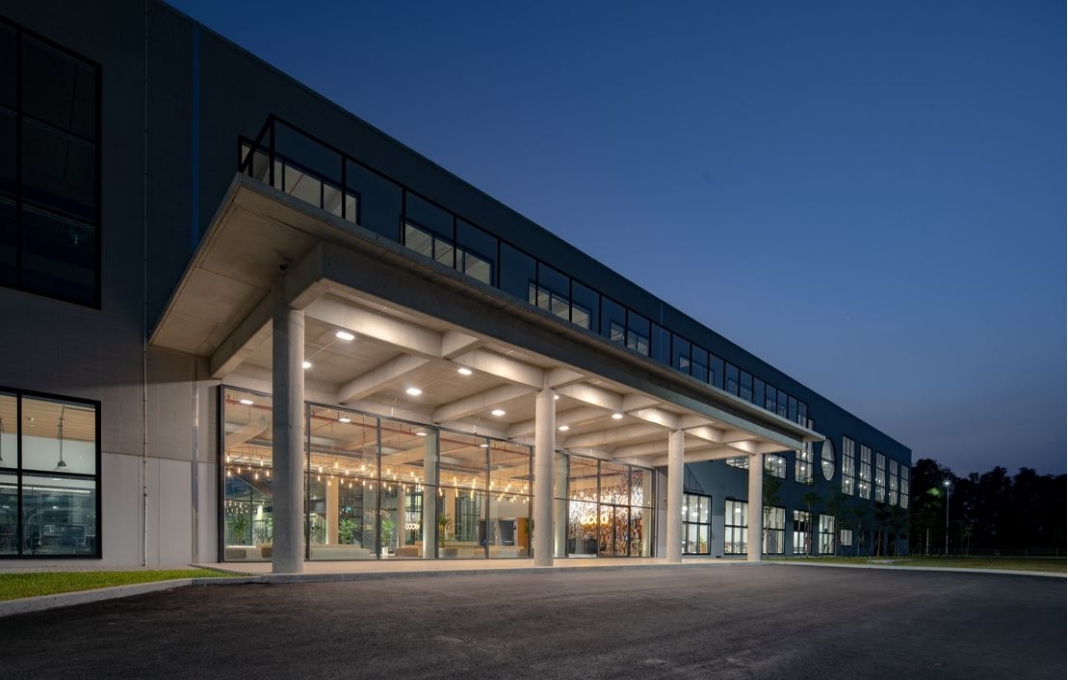Expatriates have arrived in Vietnam, with many of them staying to call it home. Those who have chosen to make this land their own have had the unique opportunity to delve deep into the very soul of Vietnam.
As we embarked on the creation of our new series, “Greennovate,” spotlighting Environmental, Social, and Governance (ESG) practices in Vietnam, our thoughts naturally gravitated toward Alex Falter, managing director of ECCO Vietnam.
Falter has been a resident of Vietnam for 16 years, a witness to the nation’s extraordinary evolution from its early days post-WTO accession to its current status as an emerging regional powerhouse.
“What does sustainability mean to you?” was my opening query to Falter, recognizing that Nordic countries have long integrated sustainability into their business models. In Vietnam, the concept of sustainable development has only recently gained prominence, driven by Prime Minister Pham Minh Chinh’s commitment at COP26 to achieve Net Zero emissions by 2050. With just over 25 years remaining to fulfill this promise, Vietnam is still in the process of defining what sustainability means on a national scale.
Falter’s response echoed the essence of sustainability: “Ensuring that our actions today do not jeopardize the well-being of future generations,” mirroring the definition put forth by the 1987 Brundtland Commission.
Regrettably, the reality paints a different picture. In 2021, Vietnam ranked 36th out of 118 countries for air pollution, with Hanoi and HCMC among the top 15 most polluted cities in Southeast Asia(1). An estimated 71,365 Vietnamese lives were claimed by pollution in 2017, the most recent available data. Furthermore, Vietnam is one of the world’s top four plastic waste producers, churning out a staggering 280,000 tons annually. On average, each Vietnamese citizen consumes 41.3 kilograms of plastics annually, equivalent to 7,600 plastic grocery bags (2). These statistics evoke a sense of sadness and disbelief, given Vietnam’s rich history of sustainable practices.
Falter reflected on this historical contrast. When he first arrived in Vietnam, he marveled at the resourcefulness of the Vietnamese people in utilizing various materials. For instance, banana leaves were ingeniously employed to wrap food, ensuring cleanliness and freshness. Banana flowers and stalks served as pig feed.
“Isn’t this a holistic approach to resource utilization, a natural form of packaging that reduces the need for disposable materials?” Falter inquired.

In those days, nothing went to waste in Vietnam; everything was repurposed, with waste often transformed into valuable items. “I was amazed to see condensed milk cans repurposed as components of motorcycle exhaust systems. Back then, I witnessed a sea of dreams flowing through the streets, with small-engine cars and bicycles,” he reminisced.
These creative approaches to repurposing everyday items contributed to a significant reduction in waste generation. This cultural perspective and mindset had far-reaching implications, impacting daily life, from household practices to community interactions. Sadly, in contemporary Vietnamese society, these traditional practices are often perceived as outdated, while materials like plastic packaging are considered modern, convenient, and uniform. Although plastic has indeed been a boon for many generations and communities, it fails to biodegrade and necessitates complex waste management for recycling.
Hidden costs
The rapid urbanization of Vietnam and the growing middle class have driven up demand for plastics across various sectors. However, the lack of adequate waste management infrastructure has led to a proliferation of single-use plastics littering streets, rivers, beaches, and mountains.
In recent years, Vietnam has generated a staggering 25.5 million tons of waste, with 75% ending up in landfills (3). An estimated 3.1 million metric tons of plastic waste are disposed of illegally, with at least 10% of this waste finding its way into waterways, making Vietnam one of the world’s top five plastic polluters of the oceans. Over 60% of these plastics are single use(4).
The impact extends beyond environmental concerns. Waste poses a significant economic setback and places a substantial financial burden on society. Both Hanoi and HCMC allocate VND1.2 trillion to VND1.5 trillion (equivalent to US$52 to US$65 million) annually, constituting 3.5% of their budgets, for waste collection and disposal (5). A recent World Bank study estimates that about 75% of the material value of recyclable plastics in Vietnam is lost annually, equivalent to US$2.2 billion to US$2.9 billion, because used plastics are not properly sorted, collected, or recovered. Expanding such recycling efforts could significantly impact Vietnam’s GDP growth, reduce the need for imports, and enhance the trade surplus.
Sweden provides a compelling example, with 54% of household waste being converted into energy in 2020, and 61% of all packaging materials being recycled the same year (6). While Vietnamese authorities have recognized the need for change and introduced Decree 45/2022/ND/CP mandating trash separation since August 2022, successful implementation and strict enforcement remain crucial challenges.
To trigger compliance and foster a circular economy, the Government should create favorable conditions for the recycling industry to flourish. Currently, many recyclers in Vietnam operate as cottage industries with low recycling rates compared to input and imports. Government support through clear regulations, low entry barriers, and financial incentives could transform the industry.
“And perhaps we, as consumers, need to change our mindsets. Could a cultural shift from a consumption-driven lifestyle back to traditional practices of resourcefulness be the solution? Could those old habits become the new modern?” Falter and I wondered.
Crucial role of stakeholders
In recent years, Vietnam has undergone remarkable industrial development, evolving into a favored manufacturing destination. This transformation has allowed the country to assemble a wide range of components from global sources. However, as regional competition intensifies and ESG standards become global imperatives, Vietnam faces the need for a more strategic vision and decisive actions. Multinational corporations (MNCs) no longer view Vietnam solely as an assembly location but seek partners that align with their sustainability goals, reduce import reliance, and address logistical challenges. To attract increased foreign direct investment (FDI), Vietnam must aspire to become a tier 1 supplier.
“This endeavor is not the responsibility of any one party but requires collaboration from all stakeholders. We are all in this together, each with roles and responsibilities, including the Government, corporations, and undeniably, consumers,” emphasized Falter.
With the recent signing of the Eighth National Power Development Plan (PDP8), Vietnam has taken a significant step toward a greener future. However, in a constantly evolving world and economy, much work remains.
For the Government, it is imperative to expedite the implementation of PDP8, driving the transition to renewable energy while reducing reliance on fossil fuels. Regulations must align with the green transition, encompassing areas like renewable energy, rooftop solar, waste management, and water management. Financial incentives and support should be provided to businesses adopting sustainable technologies and practices.
Public awareness should be elevated through campaigns, education, and information dissemination regarding sustainable choices. Stringent environmental regulations must be enacted to mandate sustainable practices, thereby reducing adverse impacts on ecosystems. Infrastructure enhancements, such as improved utilization of Inland Container Depots (ICDs) and a review of rail opportunities, can help alleviate road congestion and reduce CO2 emissions from stop-and-start traffic.
Fortunately, Vietnam boasts several natural advantages, including a lengthy coastline suitable for wave and wind power, a mountainous North that supports hydropower, and ideal climatic conditions for photovoltaic panels in South East Asia, particularly in the South. Beyond renewables, Vietnam is well-positioned to explore untapped “blue ocean” sectors. The combination of hydrogen and blue ammonia production with renewable energy projects (hybrid projects) presents a viable option for generating clean energy (7). Vietnam not only has the potential to outperform regional competitors by offering a green platform for FDI investors but also to lead in new industries.
For corporations, integrating sustainability into business operations is paramount, especially in new projects. Vietnam’s greenfield projects present a unique opportunity for such integration. From a corporate perspective, particularly in Western countries, there is a growing consensus that sustainability benefits society and the environment while positively impacting the bottom line, both tangibly and intangibly. Corporations also wield significant influence in promoting sustainability through their supply chains, encouraging suppliers to adopt eco-friendly practices. ECCO, for example, stands as a testament to commitment.
“ECCO takes control of its supply chain and retail outlets, implementing sustainability measures vertically across the organization,” noted Falter. The company has woven sustainability deeply into its corporate culture, making it a fundamental part of its identity, and employs innovative technologies for water conservation.
“ECCO invests heavily in research and development to reduce its environmental footprint and embraces a holistic approach to product design, incorporating waste reduction considerations right from the initial stages of development,” added Falter.
Starting from scratch is better than retrofitting
Sustainability often involves substantial initial investments, but savvy investors understand the long-term returns it offers.
ECCO’s Green Factory in Binh Duong Province is a prime illustration of this approach in practice. The factory, which commenced operations in Vietnam in 2020, embodies a commitment to sustainability throughout its development. It incorporates green design principles and seamless technology integration, demonstrating ECCO’s dedication to sustainable practices. LEED principles, renewable energy sources like solar power, rainwater harvesting systems, and eco-friendly construction materials are integral to the factory’s design.
ECCO also promotes eco-friendliness by installing electric vehicle charging stations for its 1,800 workers. Thoughtful placement of windows and doors, as well as innovative water management techniques like desert grass usage, further enhance energy efficiency.
Consumer influence
Resource maximization extends the lifespan of seemingly ordinary elements, such as discarded banana leaves, transforming them into valuable contributions to a circular economy. Sustainability, in this context, transcends monetary value and embodies the conscious intention to nurture, preserve, and advance our world towards harmonious coexistence.
Consumer power lies in their demand for sustainable products. By expressing a preference for eco-friendly alternatives, consumers can drive corporations to adopt greener practices and offer environmentally responsible products.
Promoting sustainability also hinges on education and awareness initiatives, ensuring consumers are well-informed about sustainable choices that align with their environmental values.
I shared with Falter, “We need to encourage Vietnamese consumers to bring reusable bags when they shop and choose products with minimal plastic packaging. For example, opt for groceries wrapped in banana leaves instead of plastic.” These small changes represent meaningful steps in our collective journey toward sustainability.









